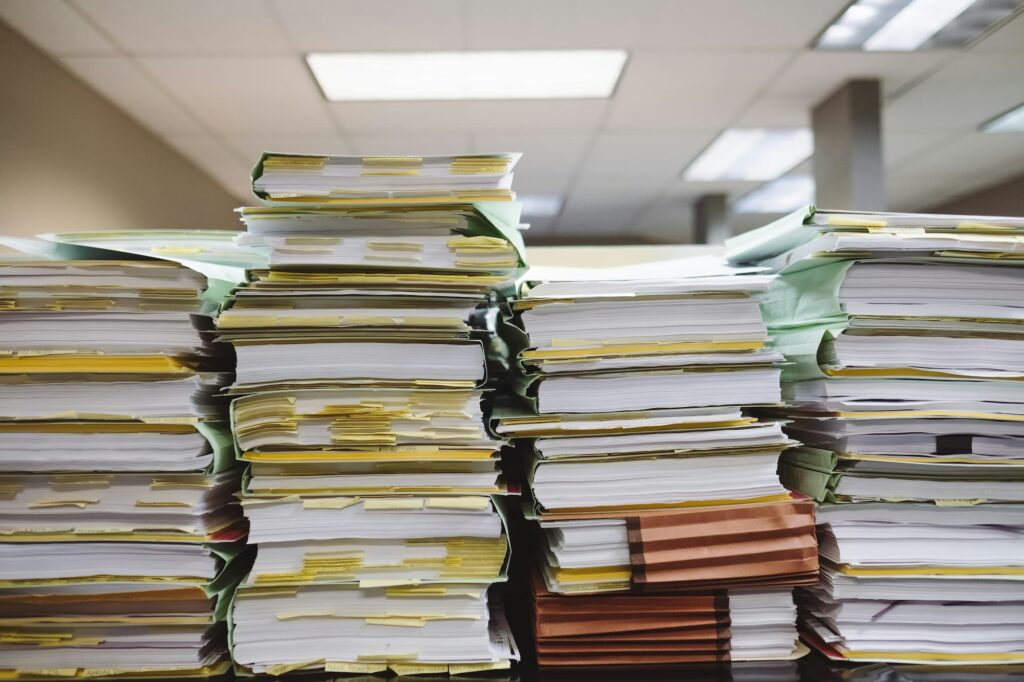It is very important to be able to keep up with your paperwork. Not having your paperwork in order can mean losing track of important bills to pay, or losing important items that will then cost a lot of time or money to replace, or are even irreplaceable.
But do you need an expensive filing system to be able to keep track of your paperwork? No. Here’s how you can file your paperwork without needing to spend extra money.

Papers have a habit of turning up everywhere: at the bottom of bags, stuck in drawers, or piled up on the kitchen counter. For parents juggling work, school deadlines, appointments and finances, it’s easy for paperwork to spiral out of control.
Staying organised can feel like an extra chore, especially when solutions often seem to involve pricey filing systems or digital tools you don’t need. But keeping track of important records doesn’t have to cost anything. Staying on top of things is easier with a bit of structure, a few simple habits, and what you already have at home.
This guide walks through practical, low-cost ways to organise your paperwork without adding stress or expense.
Know What’s Worth Keeping
Before organising anything, it helps to know what actually matters. Not every receipt, newsletter or school flyer needs saving. That’s where a quick filtering method can help.
Create three loose categories. The first holds documents you’ll always need, such as birth certificates, NHS numbers, benefit letters, ID copies, and school reports. These belong in one place that’s easy to reach.
The second category is for short-term documents like permission slips, prescriptions, and current bills. These should be easy to grab but cleared out often.
The final group includes anything you’re done with, like warranty info for sold items, expired forms, or completed applications. These can usually be recycled or shredded. Sorting becomes faster when you know what belongs where. Stick a small label on each section so you never second-guess where to file something.
Make Quick Updates Without Rewriting Everything
It’s common for parents to have to change small details on a document. You might have filled out a housing support form and then moved house. Or there’s a need to fix a spelling error or update a phone number on a school application.
These edits don’t always mean starting from scratch. A document that’s been printed or saved as a PDF doesn’t need to be rewritten or scanned again. It’s often more efficient to convert it into an editable file and adjust only what’s necessary.
That small step saves time, avoids errors, and keeps things clean and clear. It also means you’re not scrambling for pens, scanners, or trying to retype a whole form just for one update. Keep this trick in mind whenever paperwork needs revising, especially for anything that gets reused each year like club forms or health records.
Use What You Already Have
Most households have enough on hand to create a basic organisation system. There’s no need for matching storage boxes or high-end stationery.
Old envelopes make great dividers. Empty cereal boxes cut in half can hold letters or folded papers upright. Spare binders from school years gone by can become sectioned files with a few reused plastic pockets. Even unused shopping bags or packaging materials can be transformed into storage containers.
If you’ve got some washi tape, masking tape or stickers, labels become easy to make. Even a sticky note will do the job. Pegs can clip things together. A spare drawer or cupboard shelf can hold everything in one spot.
Folders and boxes don’t need to look good; they just need to work. Choose something that’s easy to reach and clearly separated so no one has to shuffle through ten piles to find a school letter or benefits document.
The goal is to make documents easy to find without spending anything. Use what’s already in your home before thinking about buying anything new.
Create a Simple Weekly Routine
Paper clutter builds up because it’s often put off. Setting up a short routine once a week makes a big difference, and it doesn’t have to be a chore.
Pick a time that already makes sense, such as after your Sunday food shop or before dinner on Friday. Keep a stack of documents nearby and work through them one by one. Toss junk mail, file what matters, and spot anything that needs attention.
It helps to keep a bin or shredder nearby, so things don’t get re-stacked. Only one or two minutes per document is usually enough to decide where it goes. No need to overthink the process.
Even young kids can help. One can hold the bin, and another can help tick off a checklist. It makes the habit more consistent and teaches useful skills along the way. Getting children involved can also reduce the chance of misplaced or forgotten important papers.
The more regular this becomes, the less time it takes. Within a few weeks, you’ll notice that nothing piles up because you’re always just a few pages away from caught up.
Keep It Safe and Simple
Once everything is sorted, you want to know it’s protected. Spills, pets, or even just losing track of something important can undo all your effort.
Plastic sleeves or folders work well, especially for official documents. Large Ziplock bags are a decent substitute if you don’t have those. Pop them inside an envelope or shoebox to keep things dust-free and out of the way.
Consider keeping digital copies of the most important items for extra protection. A photo saved securely can act as a backup. You could even email them to yourself or someone you trust.
Storage doesn’t need to be fancy. One small space for permanent records, one temporary spot for current papers, and a backup system for must-keep documents is often enough.
Get Ahead Without Extra Costs
Taking control of personal records doesn’t need to be complicated or expensive. Parents already manage enough daily tasks, and paperwork doesn’t need to be one more thing that weighs things down.
Simple habits, clear categories, and tools that help make small changes quickly are all you need. Build a system that suits your pace, your home, and your time. Once you’ve got it working, things won’t just look more organised; they’ll feel easier to manage too.
Set aside ten minutes each week to review papers. Reuse what’s already available before spending money on extra supplies. And when forms need editing, rely on tools that help you adjust quickly and clearly.
Try one idea today. Then another next week. Bit by bit, things get easier to handle without adding cost or complexity.



